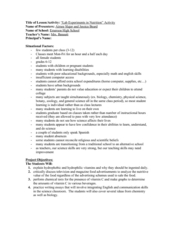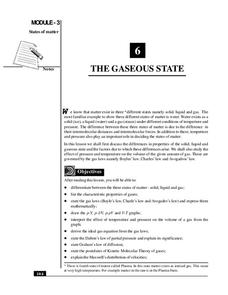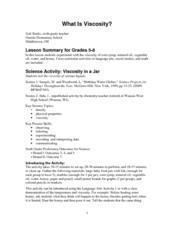Virginia Department of Education
Atomic Structure: Periodic Table
The fifth instructional activity of seven in the series outlines an in-depth analysis of the periodic table. After direct instruction, pupils take turns practicing in the group before beginning independent study. The assessments include...
Curated OER
A Plop and Fizz
Seventh graders perform an experiment to determine the effect of temperature on reaction rates. In this chemistry lesson plan, 7th graders take measurements and record data. They create a graph and analyze results.
Curated OER
Lab Experiments in Nutrition Activity
Which vitamins should be ingested daily for maximum nutrition? Learners with ispecial needs or those who are pregnant focused on television and magazines advertisements that are used to sell food products. They conduct experiments and...
Curated OER
Graphing Data from the Chemistry Laboratory
Students graph and analyze data using a spreadsheet.
Curated OER
Stream Chemistry Monitoring
Students become familiar with real-world gathering of chemical data. The experience how the science is done: the nature of analysis, data collection, interpretation, and presentation. They study a nearby body of water for their experiment.
Curated OER
In Country: An Integrated Look at the Vietnam War
Learners explore aspects of the Vietnam War and how it relates to the heritage of America. In an attempt to understand the level of involvement, students analyze statistics from the Vietnam war. Learners watch a video, read a book, and...
Curated OER
How Can You Study Things You Can’t See Like: Atoms?
Students simulate how scientists studied things they can't see like atoms. In this chemistry lesson, students predict what is inside the numbered obsertainers. They design a way to investigate what's inside without opening it.
National Institute of Open Schooling
The Gaseous State
Sixth in a series of 36, this lesson focuses on gases and their behavior in given situations. Learners review the states of matter and then focus on gases, specifically learning Boyle's, Charles's, Avogadro's Laws, Dalton's, and Graham's...
Curated OER
Teaching about Data Interpretation
Students explore a variety of relevant lake water chemistry questions, compose responses, and present their results in a poster format. They, in pairs, answer questions about lake chemistry which are imbedded in this plan.
Curated OER
Creating an Enzyme-Substrate Model
Learners explore the reaction rates of an enzyme-mediated reaction through experimentation. In small groups, they use everyday objects to demonstrate the effects of environmental variables on enzyme function.
Students graph and...
Curated OER
Column Chromatography
Students research the mechanics of liquid chromatography. In this technology instructional activity, students calculate the concentration of unknown samples. They write a report about their research and lab results.
Curated OER
Children's Literature Across the Curriculum Ideas-Magic School Bus
Learners read The Magic School Bus Gets Baked In A Cake: A Book About Kitchen Chemistry by Joanna Cole. They complete a variety of cross-curricular activities surrounding the study of kitchen chemistry. Included are reading, art, math,...
Kenan Fellows
Density
Most scholars associate density with floating, but how do scientists determine the exact density of an unknown liquid? The third lesson in a seven-part series challenges scholars to find the mass and volume of two unknown liquids. Each...
Curated OER
How Toxic Is It?
Students participate in an activity in which they investigate the scientific method and seed germination as well as practice graphing and metric measuring skills. Students examine toxicity by exposing Wisconsin Fast Plants seeds to toxic...
Curated OER
We're Off To the Races!
Second graders use a magnet to "race" objects from one side of a racing track to another. They predict what the results are, then run the race. Pupils sort and graph which items were successfully moved, they attempt to race again. This...
Virginia Department of Education
Moles Lab Activities
Want my name and number? It's 6.0221415 times 10 to the 23rd, and my name is Avogadro. Providing nine different activities, experiments, and labs, this lesson keeps Avogadro relevant to your class all year long.
Curated OER
# 21 Measuring Nitrate by Cadmium Reduction
Students design an experiment to evaluate the effects of various treatments on the nitrogen cycle in a freshwater aquarium. They are required to maintain a laboratory notebook of all work, measure the key analytes of the biosystem at...
Curated OER
Weighted Averages
Weighted averages can be tricky to explain! However, this study guide makes it easy for teachers by including definitions, explanations, and breaking down problems into three steps. Includes mixture problems and uniform motion problems.
NOAA
Ocean Layers II
Now that you know the ocean has layers, let's name them. The seventh installment of a 23-part NOAA Enrichment in Marine sciences and Oceanography (NEMO) program covers terminology associated with ocean layers, such as thermocline and...
University of Georgia
Splat!
What does viscosity have to do with splatter? An activity shows that the viscosity of a substance is inversely proportional to the distance of its splatter. Learners conduct the experiment by collecting data, graphing, and analyzing the...
Curated OER
Sink or Float
Second graders explore floating and sinking and make predictions about whether certain objects are likely to sink or float. They read the story Who Sank the Boat? by Pamela Allen. Pupils loacate rhyming words and discuss the events of...
Curated OER
Perceived Risks
Students rank a list of everyday risks to compare with classmates. They rate each risk on both its ability to be controlled and its observability in the environment. Results are graphed.
Curated OER
What Is Viscosity?
Students experiment with the visocosity of corn syrup, mineral oil, vegetable oil, water, and honey. They research viscosity before beginning. Pupils draw the conclusion that the marble sinks more slowly in the liquids with greater...
Curated OER
Review Set
The topics covered in these multiple choice questions are about atomic structure and bonding, state configurations, pressure and solution concentration, and energy graphs. This is a midterm review which could be used with the whole...

























